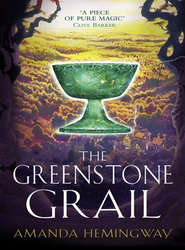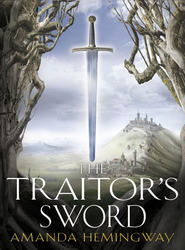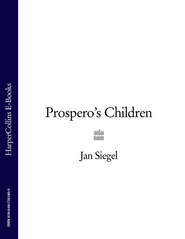По всем вопросам обращайтесь на: info@litportal.ru
(©) 2003-2024.
✖
The Poisoned Crown: The Sangreal Trilogy Three
Автор
Год написания книги
2018
Настройки чтения
Размер шрифта
Высота строк
Поля
‘I think,’ said Bartlemy, ‘he’s the key.’
‘I have experience of keys,’ said Ragginbone. ‘Perhaps I should have said, what is he?’
‘A boy. A relatively normal boy, insofar as anyone is normal. Intelligent, resourceful, courageous – but a teenager.’
‘He’ll grow out of that,’ said Ragginbone. ‘Is he Gifted?’
‘Not in the accepted sense. The power of the Lodestone on which Atlantis was founded has never touched his genes. But he has … ability. To be precise, the ability to move between worlds. There is a portal in his mind – he passes it in dreams – in extreme cases, his sleeping form disappears altogether, materialising in another universe. He seems to have little or no control over the phenomenon, but I suspect that someone else may be controlling him – guiding him – even protecting him. Someone from beyond the Gate. He has dreamed of a dying world, of a few survivors on the last planet, one stop from extinction. The ruler there is trying to perform a Great Spell. Plainly, Nathan has a vital part to play, presumably as a gatherer of certain objects. He has already retrieved the Grail, as you have heard, also a sword.’
‘Extraordinary,’ said Ragginbone, after a pause. For him, this was strong language. ‘Great Spells are perilous, and may be millennia in the preparation. Are you sure?’
‘The necessary elements are there. The feminine principle, the masculine principle, the circle that binds. A cup, a sword, a crown. The crown appears to have been mislaid, but no doubt it will turn up in time. Whenever that time may be.’
‘A cup … The Grimthom Grail?’
Bartlemy nodded. ‘I have been wondering,’ he said – changing the subject, or so it seemed, but Ragginbone knew better – ‘about a theory of yours. The Gift, as we know, is not native to the human race: the Stone of Power in Atlantis warped those who lived in its vicinity, giving them the talents their descendants still possess. Longevity, spellpower, the various madnesses that they engender. You have always maintained that the Stone itself was the essence of another universe – a universe with a high level of magic – accidentally catapulted into our own. Supposing, instead, it was just a part of another universe – an entire galaxy, for example – and its presence in our world was no accident …?’
‘In infinity and eternity,’ Ragginbone said, ‘all things are possible. What are you suggesting?’
‘Perhaps our universe was chosen – as a refuge or an escape route – many ages ago, at least in our Time. The Gift may have been given so that certain individuals could perform their part: Josevius Grimling-Thorn, called Grimthorn, who accepted the Grail, and myself, as Nathan’s protector when he was a baby. My role has been very minor; nonetheless …’
Ragginbone was frowning. ‘I don’t like it,’ he said abruptly.
‘It was merely a hypothesis,’ Bartlemy said. ‘I was looking for a pattern in Chaos, but—’
‘You misunderstand me. The theory is viable. That’s what I don’t like.’
‘You mean—’
‘I was thinking of the classics,’ Ragginbone said. ‘Timeo Danaos et dona ferentes.’
‘I fear Greeks bearing gifts. A reference to the Trojan Horse, a gift whose acceptance by the Trojans led to the downfall of their city.’
‘Exactly,’ Ragginbone said.
It rained heavily that night. In the visitor’s bedroom under the eaves the roof leaked, though it had never leaked before. Ragginbone woke, or dreamed he woke, and saw the steady drip-drip from the ceiling, and the water spreading in a puddle on the floorboards. Presently, a hand emerged – a white cold hand with bluish nails, like the hand of someone who has drowned – and groped round the edge of the puddle, seeking for purchase. The wolf-dog approached and growled her soundless growl, snapping at the crawling fingers, and the hand withdrew, slipping back into the water. The puddle shrank and vanished. The dripping stopped.
‘No spirit can enter here uninvited,’ Bartlemy said in the morning. ‘Are you sure it wasn’t just a dream?’
‘The time is out of joint,’ Ragginbone said. ‘The old spells are unravelling; even the Ultimate Laws may no longer hold. The future casts more than a shadow. Whatever is coming, it may change everything.’
‘Keep in touch,’ Bartlemy adjured, seeing his visitor to the door.
‘I will,’ promised Ragginbone. He did not say how. He strode off under a drizzling sky with the she-wolf at his heels, and Bartlemy returned to the sanctum of his living room, looking more troubled than he had done in a long, long while.
Another visitor came to Thornyhill Manor that week, but he came to the back door and would have been seen by no one, unless they had weresight. He was barely four feet high and bristled with tufts of hair and beard, sprouting in all directions as if the designer of his physiognomy had never quite sorted out which was which. His clothing was equally haphazard, rags of leather, Hessian, oilcloth tacked together more or less at random, covering his anatomy but unable to produce a recognisable garment. But the most noticeable thing about him was his smell – the stale, indescribable smell of someone who has slept in a foxhole for a hundred years and thinks bathing is bad for your health.
Bartlemy seemed oblivious to it. He made food for his guest, rather strange food, with ingredients from a jar that sat on an obscure little shelf in the corner of the kitchen all by itself. His cooking gave off the usual aroma of herbs and spices and general deliciousness, but Hoover sniffed suspiciously at a morsel that fell to the floor, and let it lie. While his guest was eating Bartlemy poured two tankards of something home-brewed and flavoured with honey and sat back, waiting with his customary patience.
The dwarf made appreciative noises as he cleared his plate.
‘Ye can chafe up a mean dishy o’ fatworms,’ he remarked in an accent whose origins were lost in the mists of time, ‘e’en though they were no fresh. Howsomedever …’
‘You didn’t come to talk of cooking, I imagine,’ Bartlemy supplied.
‘Nay. Nay, I didna, but there’s no saying I wouldna rather talk o’ food and drink and the guid things in life, instead o’ the dark time to come. Ye’ll be knowing it, I daresay. Ye’re one who would read the signs and listen to the whisperings. The Magister, he used to say to me: There’ll be one day, one hour – one hour o’ magic and destiny – one hour to change the world. I didna care for that, ye ken. The world changes, all the time, but slow, slow. What kind o’ change can ye be having in a wee hour? It canna be anything guid, not to be coming that quick. Aye, and the Magister’s face would light when he spoke of it, wi’ the light o’ greed and madness, though he were niver mad. He didna have that excuse.’
Some time in the Dark Ages the dwarf had worked for Josevius Grimthorn, scion of the ancient Thorn family – once owners of Thornyhill – and a sorcerer rumoured to have sold his soul to the devil. What he had gained from the transaction no one knew, but he was said to have lived nearly seven hundred years and died in a fire in his own satanic chapel, leaving the Grimthorn Grail to the guardianship of his descendants. That guardianship, like the manor, had passed to Bartlemy. The dwarf had fallen out with his master and been imprisoned for centuries in a subterranean chamber in the Darkwood, until Nathan and Hazel inadvertently released him. The lingering dread of his old master’s activities still remained with him.
His name, when he remembered it, was Login Nambrok.
‘Did he tell you exactly when this hour is due?’ Bartlemy asked.
The dwarf heaved his shoulders in a shrug bigger than his whole body. ‘He said I would feel it,’ he offered, ‘i’ the marrow o’ my bones. I’m no siccar there’s much marrow left – my bones are auld and dry – but there’s an ache in me like a warning o’ foul weather to come. And there are other signs than my auld bones. The sma’ creatures i’ the wood, they’re leaving – aye, or scurrying round and round like they dinna ken where to go. And there’s birds flying south wi’ tidings o’ darkness in the north, and birds flying north wi’ rumours o’ trouble in the south, and so it goes on. There’s times I think the wind itself has a voice, and it’s whispering among the leaves, but mebbe that’s a’ fancy. And there’s them – the invisible ones – they’d gather down by the chapel ruin, under the leaves, muttering together in the auld tongue, though I doot they understood the words – muttering and muttering the charms that magicked them. But lately …’ He broke off with something like a shudder.
Bartlemy looked a question.
‘There was a hare I’d been following,’ Nambrok said. ‘I’d fancied him for my dinner, and I’d been stalking him a while, quiet as a tree spider, and he went that way. They saw him. Time was, they wouldn’t have troubled any beast, but they saw him and chased him, down the valley and up the valley, chased him till he couldna run further, and then they were on him and crowding in his head, and now the puir creature is madder ‘n March, and bites his own kind, and snarls like a dog when ye come near him. That’s no honest end for a beastie. And ye canna eat a creature that’s been so enspelled. There’ve been others, too … and one day it’ll be man, not beast. It’ll be some chiel walking in the woods, or a dog that sets on his master. There’s no reason to it – nothing to guard – no threat – but …’
‘They’re out of control,’ Bartlemy concluded. And he repeated, more to himself than his companion: ‘The old spells are unravelling. Things are beginning to fall apart …’
‘Aye,’ said the dwarf, ‘and there’s little ye can be doing aboot it, or so I’m thinking.’
‘Maybe,’ said Bartlemy. ‘But we can try.’
Above Nathan’s house a single star shone. The night was misty and the sky obscured, but that one star shone brightly, a steady pinpoint of light looking down on the bookshop, while Nathan sat on the edge of the rooflight, looking up. When the dreams were most intense – when half his life seemed to happen in worlds whose reality was still unproven – he would climb up to the roof and gaze at the star, and that kept him sane. Winter and summer, its position never altered. It had been there now for two years and more, a star that did not twinkle or move along the set pathways of the heavens – a star that could not be seen beyond the borders of Ede – fixed in its place like a lamp to guide him home. His star.
He went to bed, reaching in his mind for the portal that would once more let him through, and dreamed of the star.
It hung in a chamber of darkness at the top of a tower a mile high. Light streamed outwards from its heart but seemed to go nowhere and illuminate nothing, absorbed into the gloom around it. Other stars were suspended round the periphery of the room, pale globes emitting a similar radiance, but it was his star at the centre, turning slowly on its own axis, a crystalline eye of intercosmic space. A lens on another world. Here, his world was the otherworld, the alien country. This was Arkatron on Eos, a city at the end of Time. In this room with no visible walls or floor a ruler thousands of years old – a ruler who had held a whole universe under his sway – gazed beyond the Gate to find a refuge for the last of his people, a way of escape from the Contamination that had eaten the numberless galaxies of his realm. By day, his subjects went robed and masked against the poisonous sun; by night, they slept uneasily, anticipating the End. But in this chamber it was always night. Nathan’s thought floated in the darkness, waiting. Presently, the Grandir came.
If he had a name, no one knew it. Other Grandirs had come and gone, leaving their names behind them, but he was last, and nameless. In a universe with a high level of magic, to know someone’s name is to have power over him: the power of summons, even of Command, if the summoner is strong enough. Like knowing the Prime Minister’s mobile number, Nathan reflected, smiling to himself in thought. I bet he doesn’t give that to just anybody. But the Grandir didn’t tell his name even to his nearest and dearest – if he had them – not even to his bridesister Halmé, Halmé the childless, whose beauty was a legend among her people, though few had ever looked on her face. She went unmasked only in private chambers, for the eyes of a privileged few. As for the Grandir, Nathan had seen his face naked just once, in a dream that plucked him from danger, and the memory of it still made him shiver, though he wasn’t sure why.
The Grandir wore a mask now, a white mask with perfect sculpted features, lips slightly parted to allow for speech, eye-slots covered with bulbs of black glass. He was tall even for a tall race, and his protective clothing either padded or emphasised the great width of his shoulders and the mass of what must be a muscular torso. A cowl concealed both head and hair; gauntlets were on his hands. In the gloom of the chamber Nathan could distinguish few details, but he knew the costume from many times before. He watched with the eyes of his dream as the Grandir moved among the star-globes, not touching them yet somehow controlling their rotation. It was strange to be intangible where he had once been solid, invisible where he had once been seen. He wanted to say something, but knew he would have no voice.
Every so often, a picture was projected onto the ceiling from one of the globes, a glimpse into another world. Nathan saw a castle which looked familiar – not really a castle, more a house with castle trimmings – and with a sudden shock he recognised Carboneck, where he had found the Traitor’s Sword. There were people crowding outside, in a city which had once been empty, people with bright happy faces, and a girl came out onto the steps, arm-in-arm with a young man, a girl with a lot of hair falling in many waves almost to her waist. She wore a crown of white flowers like tiny stars and a white dress which glittered with gems or embroidery. Nell, Nathan thought with a sudden stab in his heart. Nell in her wedding gown … Princess Nellwyn, who had been his friend and ally in the alien kingdom of Wilderslee, when he’d drawn the sword it was forbidden to touch, the sword possessed by a malevolent spirit and endorsed by legend … He’d kissed her in the Deepwoods under the many-coloured trees – but that was ages ago, more than a year, in a dream long faded. And in her time many years must have passed, and her face was lit with love, and Carboneck of the shadows had put out all the flags and was garlanded for a party …
Another picture, another place. A world of sea – the world of Nathan’s latest dream – a world he had visited, though only briefly, once or twice before. ‘Widewater,’ said the Grandir as if to himself, and though he spoke softly his voice was a shock, breaking the silence of that high chamber. A voice like the rasp of iron on velvet, like the whisper of thunder, like the caress of fire. ‘The realm of Nefanu the mer-goddess, who hates all things that breathe the air. But there is always land under the sea, under the blue deeps and the green shallows. One day the mountains will lift up their heads, and touch the clouds once more.’
The star-globe could not see beneath the waves, but the image showed several marine animals leaping and diving in a glitter of spray – seals? No: dolphins or porpoises. But there was one among them who looked different, a mercreature with arms which glowed like pearl and a purple tail, flying higher than the others, almost as if she would take wing. And when the school had moved on she remained, head above water, dark hair uncoiling like smoke in the wave-pattern, gazing up into the sunlight, up at a star she could not see. Denaero? Nathan wondered, but the vision was too far off to tell.
Then Widewater vanished, and now it was his star upside down on the ceiling. His world. The patchwork of roofs and gardens that was Ede, little streets and twittens and paths, the meadows stretching down to the river. The mooring at Riverside House, with an inflatable tied up there, and children jumping on and off – presumably the Rayburns – under the casual supervision of their mother. One little girl – a brown-skinned elf with nubbly plaits – slithered down the bank and fell in, disappearing immediately under the water. No one noticed. Nathan wanted to cry out, but he couldn’t be heard in the dream, let alone beyond. For what seemed like an age the river-surface remained unbroken. Then her head bobbed up again, mouth open in a wail, as though she had been thrust up from below, and her family were snatching at her, too many rescuers tangling with each other in their haste, and she was plucked out of the water, onto the bank, and hugged and fussed over and dried.
The picture blinked out, and Nathan was just a thought in the dark. The Grandir was standing close to him, a huge physical presence where he had none – Nathan could hear the murmur of his breath through the mask, sense the steady motor of his pulse which seemed to make the air vibrate. And suddenly Nathan felt the Grandir was aware of him, listening for his thought, reaching out with more-than-human senses for the ghost that hovered somewhere near, unseen but not unknown. An inexplicable panic flooded his spirit, violent as nausea, and the dream spun away, and he was pitched back into wakefulness on the heaving mattress of his own bed.
Gradually, the mattress stabilised and Nathan subsided into normal sleep. There were no more dream-journeys to other worlds, but he was haunted by images of Princess Nell in her wedding dress, running and running through an endless network of corridors, while he tried in vain to follow. Her laughter woke him in the morning, fading into music as the alarm went off and his radio started to play.
TWO Terror Firma (#ulink_92548cc0-179e-5b00-94b2-dd9fe199c7fc)










